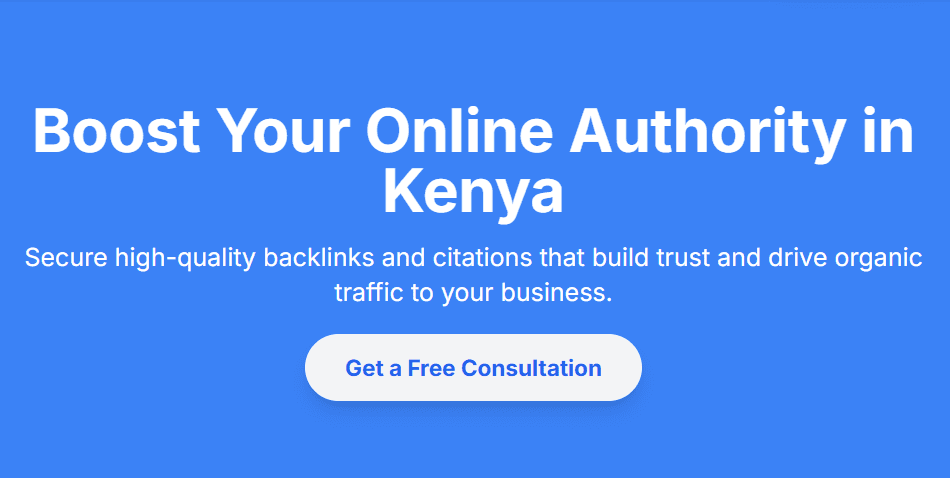Off-Page SEO (Link Building) in Kenya
- Delivery Time2 Weeks
- English levelProfessional
- LocationUSA, United Kingdom, United Arab Emirates, New York, Nairobi, Kilimani, Kenya, Dubai, CBD Nairobi, Canada, Australia
Service Description
The cost of Off-Page SEO(Link Bulding)in Kenya is 80000KES per month.Get Off-Page SEO (Link Bulding) in Kenya at price of 30000KES per month at Black Shepherd Technologies.
Boost your website’s authority and visibility in the Kenyan market with a powerful off-page SEO strategy. Learn about crucial link building tactics, from local citations and guest blogging to influencer outreach and social media engagement, all tailored for Kenyan businesses. Discover how to build a strong online presence and drive organic traffic that converts.
In the dynamic and increasingly competitive digital landscape of Kenya, establishing a strong online presence is no longer a luxury but a necessity for business growth. While a well-designed and optimized website (on-page SEO) is the foundation, it’s the external signals—the “votes of confidence” from other websites and online platforms—that truly propel a site to the top of search engine results pages (SERPs). This is the essence of off-page SEO, with link building as its cornerstone. This guide delves into the intricate world of off-page SEO in Kenya, providing an overview of strategies, best practices, and local nuances that businesses must embrace to succeed. We will explore how link building, when executed correctly, can transform a website’s authority, drive targeted traffic, and ultimately, lead to sustainable business growth in the Kenyan market.
The Role of Off-Page SEO in the Kenyan Digital Ecosystem
Off-page SEO encompasses all the activities performed outside of your website to improve its ranking in search engines. These activities signal to search engines like Google that your website is credible, relevant, and trustworthy. For Kenyan businesses, this is particularly important as the online market matures and consumer behavior increasingly shifts towards online research and purchasing.
The Kenyan market presents a unique environment for off-page SEO, a mix of global digital trends and local-specific platforms. While the core principles of off-page SEO are universal, their application must be tailored to the local context. For instance, a backlink from a reputable Kenyan news outlet, a local business directory, or a popular Kenyan blogger can be even more impactful for local search visibility than an international one. The primary goal of off-page SEO is to build a website’s domain authority (DA) and page authority (PA), which are strong indicators of a website’s strength and are heavily influenced by the quality and quantity of backlinks.
The Cornerstone of Off-Page SEO: Link Building
Link building is the strategic process of acquiring hyperlinks from other websites to your own. These backlinks are the digital equivalent of a recommendation. Search engines view them as votes of confidence, and the quality of these votes is paramount. A backlink from a high-authority, relevant website carries significantly more weight than one from a low-quality, spammy site. In Kenya, a successful link building strategy is one that is both diverse and highly relevant to the local market.
Here are some of the most effective and ethical (white-hat) link building strategies tailored for the Kenyan context:
1. Local Citations and Business Listings
For any Kenyan business with a physical location, local SEO is a game-changer, and local citations are a key component. A citation is a mention of your business’s name, address, and phone number (NAP) online.
Google Business Profile (GBP) Optimization: This is the most crucial step. A fully optimized GBP listing ensures your business appears in the Google Maps Pack and local search results, directly impacting local traffic.
Kenyan Directories: Listing your business on reputable Kenyan directories and classifieds sites is essential. Platforms like Yellow Pages Kenya, Pigiame, and Businesslist.co.ke are excellent sources for local citations and can provide valuable backlinks.
Industry-Specific Directories: Seek out listings in directories specific to your industry, whether it’s a list of top restaurants in Nairobi or a directory of tech companies. These links are highly relevant and therefore more valuable.
2. Guest Blogging and Content Partnerships
Guest blogging involves writing and publishing an article on another website or blog in your industry. This is a powerful tactic for two main reasons: it provides a high-quality backlink and exposes your brand to a new, relevant audience.
Identify Relevant Kenyan Blogs: Research and identify influential Kenyan blogs and online publications that align with your industry.
Pitch Valuable Content: Propose a topic that offers genuine value to their audience. For example, a fintech company could write a guest post on a popular finance blog about “Digital Lending Apps in Kenya: A Guide for Small Business Owners.”
Build Relationships: Guest blogging is about building relationships with other bloggers and content creators in your niche, which can lead to future collaboration opportunities and natural, high-quality backlinks.
3. Influencer Outreach and Collaborations
Influencer marketing has become a dominant force in the Kenyan digital space. Collaborating with influencers is not only a way to reach a wider audience but also a highly effective link building strategy.
Identify Niche Influencers: Find influencers whose audience and values align with your brand.
Offer Value in Exchange for a Link: This could involve offering free products or services for review or sponsoring a piece of content. The goal is to get the influencer to organically mention your brand and link back to your website, whether in a blog post, a social media caption, or a YouTube video description.
4. Creating Linkable Assets
The most sustainable and scalable link building strategy is to create content so valuable that other websites naturally want to link to it. This is often referred to as “link earning.”
Original Research and Data: Conduct unique research or studies on topics relevant to the Kenyan market. For example, a market research firm could publish a report on “Consumer Spending Habits in Kenya in 2025.” This original data is highly citable and will attract backlinks from news outlets, blogs, and other industry websites.
Infographics and Visual Content: Complex data and information can be made easily digestible through well-designed infographics. When other websites embed your infographic, they will often link back to you as the source.
Comprehensive Guides and Tutorials: Create definitive, long-form content that serves as the ultimate resource on a specific topic. For instance, a tour company could publish a “Comprehensive Guide to Exploring the Kenyan Coast” that becomes the go-to resource for travel bloggers and publications.
5. Unlinked Brand Mentions and Link Reclamation
This strategy involves finding mentions of your brand online that do not include a hyperlink. This is a “low-hanging fruit” link building tactic because the website owner already knows and trusts your brand.
Monitor Brand Mentions: Use tools to monitor the web for mentions of your company name, product names, or key personnel.
Polite Outreach: When you find an unlinked mention, reach out to the website owner or editor with a polite email. Thank them for mentioning your brand and simply ask if they would consider adding a hyperlink to your website.
Challenges and Best Practices for Off-Page SEO in Kenya
While the opportunities are vast, the Kenyan market also presents some unique challenges:
Varying Digital Maturity: The digital landscape in Kenya is not uniform. Urban areas like Nairobi and Mombasa have a high level of digital sophistication, while rural areas are still developing. Your link building strategy must account for these regional differences.
Quality vs. Quantity: A few high-quality, relevant backlinks from authoritative Kenyan websites are far more valuable than hundreds of spammy, low-quality links. Prioritizing quality is essential for long-term growth.
Relationship Building is Key: In the Kenyan context, link building is often about building genuine relationships with bloggers, journalists, and other businesses. Attending local events and engaging in online communities can open doors to valuable opportunities.
Avoid Spammy Tactics: Practices like link farms and paid links (without a nofollow tag) can result in severe penalties from Google. It’s crucial to stick to ethical, white-hat strategies that focus on providing value and earning links naturally.
Conclusion
Off-page SEO, particularly link building, is an indispensable part of a successful digital marketing strategy for any business operating in Kenya. It’s the process of building your website’s reputation and authority, signaling to search engines that you are a trusted voice. By focusing on local citations, strategic guest blogging, collaborating with influencers, and creating valuable, linkable content, Kenyan businesses can build a robust backlink profile that drives organic traffic, enhances brand credibility, and ultimately, fuels their growth in the digital age. The key is to be intentional, strategic, and most importantly, to focus on building genuine value and relationships within the vibrant Kenyan online community.








